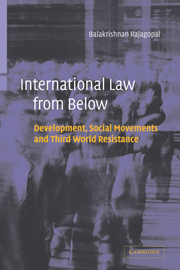Book contents
- Frontmatter
- Contents
- Abbreviations
- Preface and Acknowledgments
- Introduction
- PART I International law, development, and Third World resistance
- PART II International law, Third World resistance, and the institutionalization of development: the invention of the apparatus
- PART III Decolonizing resistance: human rights and the challenge of social movements
- 7 Human rights and the Third World: constituting the discourse of resistance
- 8 Recoding resistance: social movements and the challenge to international law
- 9 Markets, gender and identity: a case study of the Working Women's Forum as a social movement
- PART IV Epilogue
- References
- Index
7 - Human rights and the Third World: constituting the discourse of resistance
from PART III - Decolonizing resistance: human rights and the challenge of social movements
Published online by Cambridge University Press: 09 July 2009
- Frontmatter
- Contents
- Abbreviations
- Preface and Acknowledgments
- Introduction
- PART I International law, development, and Third World resistance
- PART II International law, Third World resistance, and the institutionalization of development: the invention of the apparatus
- PART III Decolonizing resistance: human rights and the challenge of social movements
- 7 Human rights and the Third World: constituting the discourse of resistance
- 8 Recoding resistance: social movements and the challenge to international law
- 9 Markets, gender and identity: a case study of the Working Women's Forum as a social movement
- PART IV Epilogue
- References
- Index
Summary
Human rights and the Third World have always had a troubled and uneasy relationship ever since they were invented as epistemological categories at the end of the Second World War. Human-rights discourse has generally treated the Third World as object, as a domain or terrain of deployment of its universal imperatives. Indeed, the very term “human rights violation” evokes images of Third World violence – dictators, ethnic violence, and female genital mutilations – whereas First World violence is commonly referred to as “civil rights” violations. At least in this sense, “human rights” have traditionally never been universal. On the other hand, the Third World – at least that which is represented by its governments – has looked upon human rights as ‘luxury goods’ that they could ill afford in their march towards development and modernization or as tools of cultural imperialism intended to disrupt the ‘traditional’ cultures of their societies. Indeed, many non-western societies do not have words that are synonymous with human rights. In many of these societies, for ordinary people, the words “human rights” often evoke images of thieves, robbers, and criminals rather than political prisoners, torture victims, or hungry children.
While this basic disjuncture and asynchrony continue to pervade the relationship between human rights and the Third World, a new sensibility has emerged. In this new sensibility, the idea of human rights has emerged as the language of progressive politics and resistance in the Third World, as seen by the West.
- Type
- Chapter
- Information
- International Law from BelowDevelopment, Social Movements and Third World Resistance, pp. 171 - 232Publisher: Cambridge University PressPrint publication year: 2003

